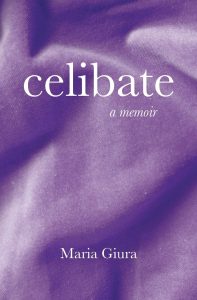 Review by Emily Webber
Review by Emily Webber
Maria Giura’s memoir, Celibate, focuses on her decade-long relationship with a Catholic priest and her journey to find her true vocation in life. As a lifelong Catholic myself, one who has wrestled with my faith and is still trying to figure it out, I approached this book with mixed feelings. I was unsure of what to expect, worried the book would be a salacious tell-all about Giura’s affair with the priest or that it would romanticize religion’s putting up the front that if one has a good enough faith, then everything is sunshine and rainbows. But I didn’t find what I feared in the pages of this memoir, and instead, it opened my heart with its honesty and touched on many different aspects of the human spirit. Notions of faith and the religious life, particularly within the Catholic Church, are central to this story, but there are themes that readers, regardless of religious background, will relate to and find compelling.
When Giura’s younger sister is born and her mother divorces from her distant father, feelings of abandonment, jealousy, and anger surface and linger into Giura’s adulthood. Giura feels invisible in her large Italian family, and with all her siblings either in relationships or getting married and having kids, she feels isolated in her call to the single life. In her mid-twenties, Giura meets Father James Infanzi at the Catholic church she attends with her family, and this sets off their complicated affair. Their relationship is all-consuming and obsessive, and while Giura shoulders half of the blame, it is immediately clear that Father Infanzi is manipulative and abusing his power. He’s engaging in a relationship with Giura when he knows she is considering her own vocation to the religious life, and he’s secretly conducting relationships with other women. While always consensual, it is uncomfortable to see their relationship unfold. Giura sits in the discomfort of things, bringing to the surface the yearning for something bigger than ourselves, and the bottomless loneliness one can feel even while surrounded by friends and family.
The daily back and forth between Giura and Father Infanzi and Giura’s struggle to find her true vocation dominates this memoir. At times, the details of Giura’s relationship with the priest overshadow everything else, and Giura’s blazing candor can be unsettling. So much time is spent on the specific details of her relationship with Father Infanzi that when Giura finally lets go of him and begins to find peace and live solely on her terms, it feels rushed. I hope that as Giura gains more distance from the relationship, she writes more about her choices and life after this turning point.
This memoir is one that honors those who pave the way for us and the importance of human relationships beyond that of a partner or spouse. Part of how Giura finds her way is by reading and studying the teachings and lives of others, mentioning Dorothy Day, Elizabeth Ann Seton, and others. There are tender and powerful scenes when Giura’s stepfather is dying. Even though Giura’s relationship with her stepfather is not perfect, it is an example of one that is full of love and respect and a bond that sustains rather than does damage.
In much of this book, Giura tackles the stigma of the single life in full force. At first, she assumes God must be calling her to the religious life because of her desire to live as a single woman. She spends a year living with the Sisters of Charity during a candidacy period, and several religious sisters provide spiritual direction. Ultimately, Giura decides the religious life isn’t for her, and still, these women, who have invested so much time in her, always have her best interests at heart and are not angry or resentful. This provides another contrast to Giura’s relationship with Father Infanzi, showing unselfish, loving relationships that are supportive, yet push Giura to be better. The sections of the book where Giura is discerning her call to the religious life also highlight the unseen work of women in the church.
The most powerful writing on faith that I’ve encountered opens itself up to the darkness, frustrations, and doubt that comes with living a faith-filled life. Giura doesn’t sugar coat anything, and every page is a testament to how hard she worked to hold on to her faith while figuring out her path in life. When Giura travels to the Motherhouse, a sister warns her to be prepared for many dark nights. This is true of anyone’s path in life, but those dark nights are made easier, as Giura’s story shows, by staying true to one’s desires and with the support of others. This memoir finds its strength in its total honesty. Giura confronts her ghosts and fear and leaves nothing unsaid, showing how to live radically true to one’s self.
Celibate by Maria Giura
Apprentice House Press, 2019, $16.99 (paper)
78-1627202145
Emily Webber has published fiction, essays, and reviews in the Ploughshares Blog, The Writer magazine, Five Points, Split Lip Magazine, Brevity, and elsewhere. She’s the author of a chapbook of flash fiction, Macerated, from Paper Nautilus Press. You can read more at www.emilyannwebber.com and @emilyannwebber.
